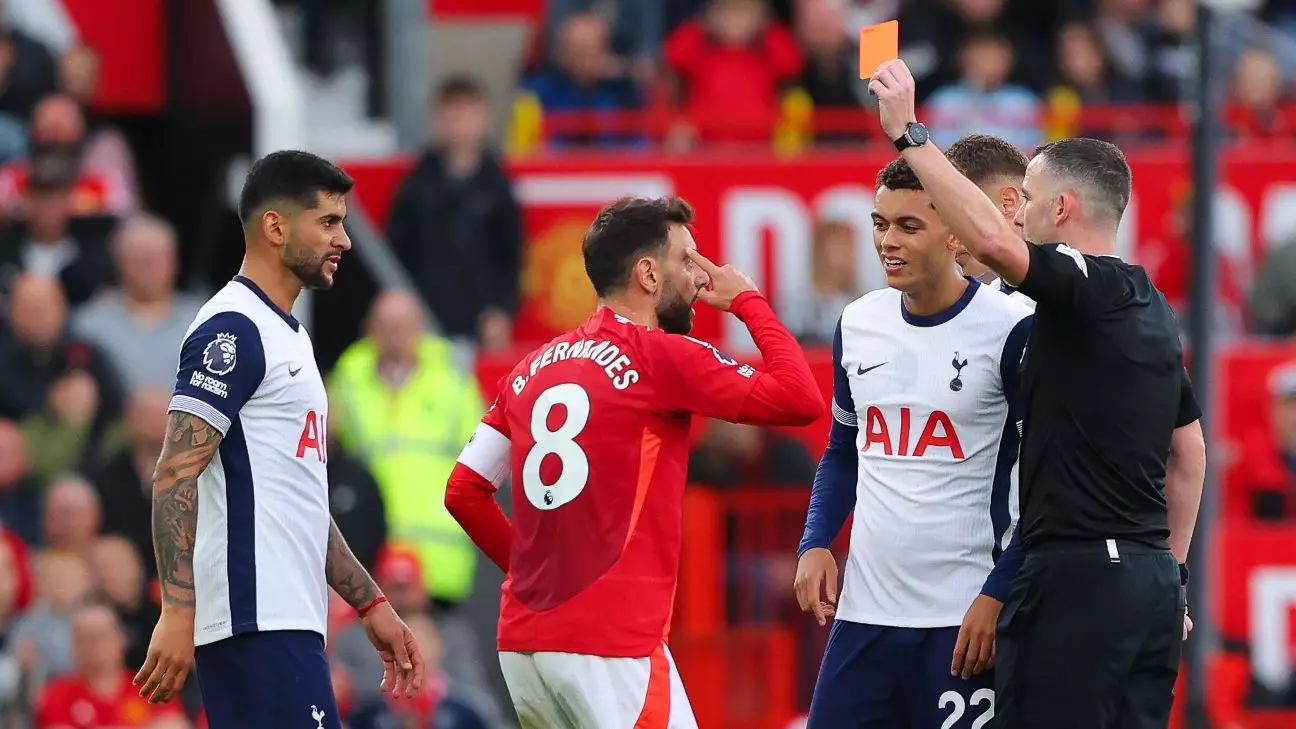### The Incident at Old Trafford
In a tense Premier League match, Manchester United suffered not only a 3-0 defeat against Tottenham Hotspur but also the controversial sending off of their captain, Bruno Fernandes. The dismissal, which occurred in the 42nd minute, sparked heated debates about officiating standards and player conduct. Fernandes claimed he did not deserve the straight red card issued by referee Christopher Kavanagh, arguing that his contact with James Maddison was minimal and unintentional.
### The Challenge Under Scrutiny
As anyone who has played competitive sport knows, moments of slip-ups can lead to grave repercussions. Fernandes’ attempt to tackle Maddison seemed innocent enough on the surface; however, the interaction raised questions regarding the rules of the game. According to Fernandes, he did not enter the challenge with studs up, maintaining that it was merely a foul that could have warranted a yellow card instead. Despite the personal repercussions, the United captain showed an unusual fortitude by facing the media post-match, an act that revealed both his frustration and accountability.
### VAR: A Missed Opportunity?
One of the salient points Fernandes raised was the lack of intervention from the Video Assistant Referee (VAR). He questioned why VAR protocols did not lead to a review of the incident, advocating for the necessity of meticulous scrutiny in pivotal moments. This incident shines a spotlight on the broader issue surrounding VAR in football; while intended to enhance fairness, its implementation often leaves fans, players, and managers alike dissatisfied. As Fernandes stated, if a foul exists, a card must be appropriately issued, but clarity is necessary to foster trust in the officiating process.
### Team Dynamics and Leadership
Fernandes’ red card didn’t just affect him; it had a significant impact on his teammates. The Portuguese midfielder openly acknowledged the challenge his absence posed to the team, commenting on their valiant albeit ultimately futile efforts on the pitch. With United down to ten men, tactical formations were challenged, and the remaining players were forced to adapt swiftly. He paid homage to the resilience displayed by his teammates, demonstrating the importance of leadership, even in the face of adversity.
### Reflections on the Future
This match exemplifies the fine line between aggression and recklessness in football. As United seeks to regain a competitive edge in the Premier League, moments like these can either serve to galvanize a squad or expose systemic vulnerabilities. The loss highlighted both on-field discipline and tactical awareness, urging the team to reflect on how they approach future matches. For Fernandes, this incident will be a learning experience—a painful reminder of the critical role he plays as captain, not only in leading but also in setting a precedent for conduct.
### Conclusion: Lessons Learned
United’s challenging outing against Tottenham brought attention to a myriad of factors affecting the outcome of games, including officiating standards, player responsibility, and tactical adaptability. Bruno Fernandes’ experience serves as an important lesson in both accountability and resilience, not just for him but for the entire squad. As Manchester United moves forward, the hope remains that such lessons will contribute to greater cohesion and effectiveness on the pitch.

